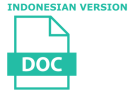Penggunaan Kosanoge Melalui Media WhatsApp dalam Pembelajaran Bahasa Jepang Di SMK Kesehatan Sadewa Yogyakarta
Mery Kharismawati(1*), Iffatu Masruro Al Hakimi(2)
(1) Sekolah Vokasi, Universitas Gadjah Mada
(2) MAN 3 Bantul
(*) Corresponding Author
Abstract
This research is a quantitative descriptive study that will describe: (1) the conditions of learning Japanese online through WhatsApp Group (WAG) at SMK Kesehatan Sadewa Yogyakarta, and (2) the students' perceptions about the use of kosanoge. The Japanese language course was introduced at this school in 2020. As the Covid-19 pandemic since March 2020 has disrupted the educational activities at schools, the teaching and learning at SMK Kesehatan Sadewa, including Japanese, must be carried out online. WhatsApp Group (WAG) was chosen as a medium for interactive and useful online learning. In practice, students are introduced to the kosanoge vocabulary game which aims to increase the student’s enthusiasm for learning. The data were taken from the results of observations of class activities and online surveys. The random sample shows that the students were happy with the implementation of the kosanoge, but some students had difficulties because they had not memorized hiragana. A further research needs to be conducted to determine the effect of teacher classroom actions taken to increase student interaction in a class by using kosanoge games.
Keywords
Full Text:
PDFReferences
Afifah, S. N., & Fanani, U. Z. (2018). Pengaruh Penggunaan Media Permainan Dokoni Karuta Terhadap Penguasaan Kosakata Bahasa Jepang Bab 6 Buku “Nihongo Kira Kira” Siswa Kelas X SMAN 1 Puri Mojokerto Tahun Ajaran 2017 / 2018. Jurnal Mahasiswa Unesa, 1–9.
Afnibar, A., & Fajhriani, D. N. (2020). Pemanfaatan WhatsAPP sebagai Media Komunikasi Kegiatan Belajar ( Studi terhadap Mahasiswa UIN Imam Bonjol Padang). Al-Munir: Jurnal Komunikasi Dan Penyiaran Islam, 11, 70–83. https://ejournal.uinib.ac.id/jurnal/index.php/almunir/article/download/1501/1122
Alqahtani, M. (2015). The importance of vocabulary in language learning and how to be taught. International Journal of Teaching and Education, III(3), 21–34. https://doi.org/10.20472/te.2015.3.3.002
Darmadi, H. (2011). Metode Penelitan Pendidikan. Penerbit Alfabeta.
Debora, Y. (2020). Riwayat Kasus Corona di Indonesia, dari Maret hingga September 2020 - Tirto.ID. https://tirto.id/riwayat-kasus-corona-di-indonesia-dari-maret-hingga-september-2020-f4d6
Kharlina, D. A., Basri, M. S., Budiani, D., Training, T., & Faculty, E. (2014). Penerapan Permainan Mistery Bag Sebagai Strategi Pembelajaran Kosakata Benda Bahasa Jepang Pada SIwa Kelas XI Tahun Ajaran 2014 SMK Kansai Pekanbaru. Riau University.
Pemda DIY. (2020). Surat Edaran Pembelajaran Jarak Jauh bagi Anak Sekolah dalam rangka pencegahan COVID-19.pdf.
Sugiyono. (2016). Metode Penelitian Kuantitatif, Kualitatif dan R&D. PT Alfabet.
Wijaya, A. (2018). Students’ Responses Toward the Use of Whatsapp in Learning. Journal of Teaching & Learning English in Multicultural Contexts, 2(1), 46–55.
Yi, H. (2014). Foreign Language Vocabulary Learning Strategies: Patterns of use among college students (Issue June). Auburn University.
Article Metrics
Refbacks
- There are currently no refbacks.
Copyright (c) 2021 The Author(s)

This work is licensed under a Creative Commons Attribution-ShareAlike 4.0 International License.







